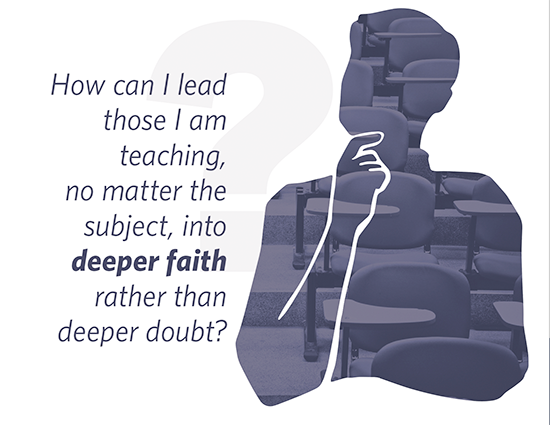




Teaching Apologetically
By Chris Talbot
Over the years, I have written a fair amount on the importance not only of teaching theology but also of teaching (and living) theologically in relation to youth ministry. I want to encourage youth pastors (and all pastors) always to have a mind toward the theological truth behind what they are teaching. How does one teach in a form that effectively respects and represents the important content being communicated?
To develop this idea rightly, we will begin with a framework or guide. Throughout history, many have chosen predecessors as guides for their intellectual journeys. Where Dante chose Virgil and C.S. Lewis chose George MacDonald, I have personally followed Francis Schaeffer as a guide, especially in relation to apologetics. As we walk through the importance of teaching apologetically, Schaeffer will accompany us, pointing out important landmarks and pitfalls and, ultimately, the right destination. By looking at his works and observing his example, we begin to understand how to teach and live apologetically.
Schaeffer was often prophetic in tone, quick to point out problems both inside and outside the evangelical camp. He wrote about the limited approach many evangelicals had toward apologetics in the early twentieth century:
The floodwaters of secular thought and liberal theology overwhelmed the Church because the leaders did not understand the importance of combating a false set of presuppositions. They largely fought the battle on the wrong ground and so, instead of being ahead in both defense and communication, they lagged woefully behind. This was a real weakness, which it is hard, even today, to rectify among evangelicals. [1]
As Schaeffer notes, evangelicals largely took the wrong approach. They did not consider the issue of presuppositions. Further, we have continued to fail in thinking comprehensively about apologetics and the Christian faith. This article considers two major steps to that end, hopefully leading us to pursue apologetics better. [2]
First Step: Anticipate Honest Questions With Honest Answers
Francis and his wife Edith founded a ministry in Switzerland called L’Abri (The Shelter). The organization offered hospitality, compassion, and truth-filled answers. Schaeffer himself noted the key tenet of “honest answers to honest questions.” In his book Two Contents, Two Realities, he laid out a vision of what a more robust apologetic approach looks like. He pointed to four things necessary to meet the needs of our age: 1) sound doctrine; 2) honest answers to honest questions; 3) true spirituality; and 4) the beauty of human relationships. [3]
People everywhere are confronted with absolute reality. Believers and unbelievers alike should ask questions. In doing so, they are bound to ask deeper questions regarding life, God, eternity, morality, and more. As we teach, we should anticipate the questions people might have. At Welch College, I teach courses on a variety of subjects. Whether theology and culture or New Testament, I try to anticipate (and even solicit) questions concerning the topic at hand. How can I lead those I am teaching, no matter the subject, into deeper faith rather than deeper doubt? It begins with answering questions with what Schaeffer called “true Truth.” The informed teacher does not encourage doubt but satisfies it with compelling answers.

As Christians, we firmly believe God speaks through the Scriptures with absolute truth. Schaeffer noted this model of answering questions with truth is based in the example set by our Lord Himself [4]. Christ and His disciples constantly answered the questions laid before them. We do well to imitate them. However, this approach requires more than simply memorizing the questions of Scripture. It “demands we have enough compassion to learn the questions of our generation.” [5] This type of preparation is hard work, requiring the teacher to be aware of psychological, spiritual, and even ecological struggles a student may be experiencing. Learning and answering the right questions requires the teacher to listen with patience and compassion.
Second Step: Love Unbelievers
This step may sound trite, but teaching apologetically requires real and compassionate love for unbelievers. This step is as true in ministry as it is in the classroom. Too often, people dispense apologetics in a formulaic manner without real concern for the situations of those interested in or skeptical of the faith. Authentic and compelling apologetic teaching is done with an eye toward understanding the world and its people.
This kind of teaching recognizes the complexity and ugliness of the world in which we live. Schaeffer expressed the following sentiment about stiff apologetic approaches: “There is no set formula that meets everyone’s need, and if only applied as a mechanical formula, I doubt if it really meets anyone’s needs—short of God’s mercy.” [6] Instead, he identified love as the dominant consideration for the apologetic method. [7]
Schaeffer argued genuine love for unbelievers keeps apologists from “objectifying” people and seeing them as “things” to be evangelized. People are not arguments to be won but, according to Scripture, are God’s image-bearers who deserve “all the love and consideration we can give them.” [8] Apologetically-oriented Christian teaching should “be shaped on the basis of love for the person as a person.” [9] Therefore, as we seek to teach in ways that answer the tough, skeptical questions aimed at Christianity, we should do so with a heart full of compassion for every student.
This kind of compassion for unbelievers requires teachers to engage with the real world and not to be tucked away in a Christian enclave. The apologetically informed teacher confronts the world and its false promises. He or she is willing to pull down intellectual strongholds and help people take every thought captive (2 Corinthians 10:5). Again, listen to the words of Schaeffer: “I am not an apologete if that means building a safe house to live in, so that we Christians can sit inside with safety and quiescence. Christians should be out in the midst of the world as both witnesses and salt, not sitting in a fortress surrounded by a moat.” [10] As Christian teachers, we engage with the world with equal parts truth and love.
As teachers within or beyond church ministry, we must walk the path of sharing the absolute truth of Scripture with compassionate love for our listeners. Men like Francis Schaeffer provide a helpful guide. Schaeffer not only proposed the steps above, but he also exemplified them. Those who knew Schaeffer touted the unique and consistent way in which he interacted with all people.
Of course, we should imitate Schaeffer only as he imitated Christ. The person of Jesus Christ is full of grace and truth (John 1:14). Truth and grace (love) are not opposed to one another or in uneasy tension. If tension existed between truth and love, Christ Himself would be divided. Instead, real love requires speaking truth to unbelief. Truth is always accompanied by deep, abiding love for individuals. If we want to combine truth and love in the way we teach, we look to Jesus. He is our example.
Let us not hold back in our teaching. Let us speak the truth of God boldly, as it plays out in all disciplines, with excellence. In doing so, let us seek to anticipate the kinds of questions believers and unbelievers alike honestly ask about the biblical worldview. As we carefully speak the truth in love, let us see people as individuals made in their Creator’s image. In so doing, we can begin truly to teach apologetically.
About the Author: Chris Talbot is the youth and family ministry program coordinator and campus pastor at Welch College. He is the author of Remodeling Youth Ministry: A Biblical Blueprint for Ministering to Students (Welch College Press). Learn more: www.Welch.edu.
Notes:
[1] Francis A. Schaeffer, The God Who Is There, The Francis A. Schaeffer Trilogy (Wheaton, IL: Crossway, 1990), 7.
[2] For those interested in Schaeffer’s comprehensive apologetic approach, see Bryan A. Follis, Truth with Love: The Apologetics of Francis Schaeffer (Wheaton, IL: Crossway, 2006).
[3] Francis A. Schaeffer, Two Contents, Two Realities, in The Complete Works of Francis A. Schaeffer, vol. 3 (Wheaton, IL: Crossway, 1982), 407.
[4] Schaeffer, Two Contents, Two Realities, 412.
[5] Ibid, 414.
[6] Schaeffer, The God Who Is There, 176.
[7] Ibid.
[8] Ibid.
[9] Ibid, 177.
[10] Ibid,175.
|

